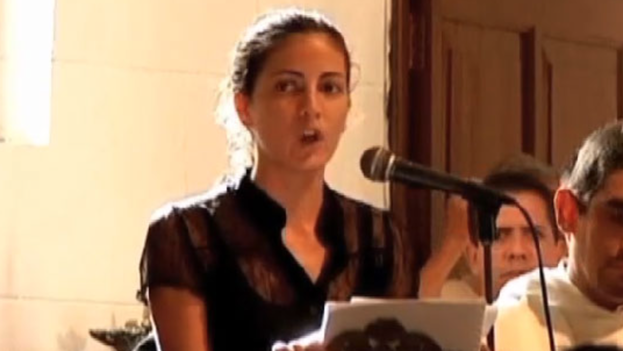
![]() 24 January 2015 (EFE) –Rosa MariaPayá, daughter of the late Cuban activist OswaldoPayá, in a meeting today with the senior advisor for Latin America at the White House, defended the need to “stop the impunity” of the Cuban government against dissidents on the island, and the right to decide for Cubans.
24 January 2015 (EFE) –Rosa MariaPayá, daughter of the late Cuban activist OswaldoPayá, in a meeting today with the senior advisor for Latin America at the White House, defended the need to “stop the impunity” of the Cuban government against dissidents on the island, and the right to decide for Cubans.
Payá, who left the island a year ago, participated in a forum on human rights, before meeting with Ricardo Zúñiga, who is part of the White House delegation that, since June 2013, secretly negotiated with Cuba the rapprochement between the two countries.
Speaking with EFE after the meeting, the activist explained that she sent the US official some “very specific” points that, in her judgment, “should be addressed with the Cuban government, which of course address ending the impunity with which State Security operates on the island.”
The Christian Liberation Movement (MCL) activist (as was her father), lamented the harassment to which some of her compatriots are subjected, a complaint that has been elevated to international organizations such as the Inter-American Commission on Human Rights (IACHR), before which she asked in 2013 for protective measures for her family.
“We want the democratic governments which are in communication with the Cuban government, to approach not only the Government but also Cuban citizens,” said the activist.
The 26-year-old daughter of dissident Oswaldo Payá — who died along with activist Harold Cepero in a traffic accident in 2012 — used the meeting at the White House to call for an independent investigation into what happened.
“What they have said to me is that there will be a discussion on human rights and that is where we want to influence, not only on the subject of independent investigation, (…) but in favor of that which is the basis of Cuban democracy,” he said.
This week negotiations begin in Havana to restore diplomatic relations after the thaw announced by both governments last December 17.
In this new scenario, Payá believes that “there are some possibilities to bring pressure for the rights of Cubans,” supporting some demands “consistent with democratic values” such as a plebiscite to “ask citizens if they want to participate in free and pluralistic elections.”
“No Cuban who is younger than 80 has ever participated in fair, competitive and free elections, so it is time that Cubans can decide their own future,” said the young woman who asked the democracies of the world to “support the right of Cubans to decide.”
“The Chileans did it in the eighties, the international community supported the Chilean plebiscite, Cubans deserve no less,” she said.
Payá’s hope, she said, lies “not in what a foreign government can do for Cuba, but what we Cubans can do for ourselves, and I hope the democracies of the world will support this.”
The young woman said that a commitment to the request for an independent investigation into the death of her father will be on the negotiating table, as well as support for the right of Cubans to decide.
